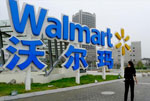Cash-strapped small firms get govt help
Updated: 2011-10-13 09:17
(Xinhua)
|
|||||||||||
BEIJING -- The State Council, or China's Cabinet, on Wednesday took a new approach toward helping the country's cash-strapped small- and micro-sized enterprises, pledging stronger financial and fiscal support to allow them to plow through current economic difficulties.
Small firms play an irreplaceable role in fostering economic growth, increasing employment, facilitating scientific and technological innovation and maintaining social stability, according to an official statement released after a State Council executive meeting chaired by Premier Wen Jiabao.
The State Council admitted that some small- and micro-sized enterprises have encountered difficulties due to heavy tax burdens and difficulty in accessing financing.
"We must pay close attention to such problems," the State Council said in the statement.
Financial and fiscal support will go to the nation's real economy, particularly to small firms in sectors that meet the nation's industrial and environmental protection requirements and can create more jobs for the country, according to the statement.
The State Council's increased support for small firms came one week after Wen visited the entrepreneurial capital of Wenzhou in east China's Zhejiang province, where the country's tightened monetary policies have bitten into many small businesses.
Small- and mid-sized enterprises create about 80 percent of the country's jobs, but still have difficulty securing bank loans, as Chinese banks prefer to lend to larger companies, especially state-owned enterprises.
According to the State Council's statement, banks should increase credit support for small businesses, while lending to small firms whose credit lines are below 5 million yuan ($786,000) should grow at a rate no lower than the average loan growth of the country's banks.
Small financial institutions that meet the loan growth target for small businesses may be subjected to lower required reserve requirements than the 21 percent currently required for major banks, the statement said.
Commercial banks are prohibited from charging fund management fees, financial consulting fees and other unreasonable fees for their services to small firms.
The State Council also offered more financing channels for small businesses to help them raise funds, promising a greater issuance of collective banknotes, bonds and short-term papers that involve two to 10 small firms.
Outstanding loans to small firms grew 26.6 percent year-on-year to hit 9.85 trillion yuan at the end of July, rising faster than the total outstanding loans of Chinese banks, said Xiao Yuanqi, an official from the China Banking Regulatory Commission (CBRC), late last month.
Wen said banks should increase their tolerance for the non-performing loan (NPL) ratios of small enterprises, set targets for the proportion and growth of loans to small companies and reduce the cost of securing credit.
Concerning the unstable private lending market that operates outside the official banking system, the State Council said governments must take effective measures to reduce informal lending, as well as crack down on illegal fund-raising and financial pyramid schemes.
To support small businesses, the State Council has also formulated fiscal policies, such as raising the tax threshold for small firms paying corporate value-added taxes and business taxes, forgiving banks' stamp tax on lending contracts with small firms for three years and boosting the scale of special funds designed for small- and mid-sized enterprises.
At least 80 cash-strapped businessmen in Wenzhou have committed suicide or gone into hiding to invalidate more than 10 billion yuan ($1.6 billion) in debt owed to individual creditors pooled from the private lending market, according to a Xinhua investigation.
China has made stabilizing prices a top priority in its macro-economic controls while trying to avoid harming the growth of the world's second-largest economy with its tightened monetary policies.
China saw its consumer price index (CPI), a main gauge of inflation, rise 6.2 percent year-on-year in August, far above the government's four-percent target for the year.
The People's Bank of China (PBOC), or China's central bank, has raised its benchmark interest rate three times this year and increased its reserve requirement ratio six times during the same period.
Related Stories
China sets low Q1 loan quota for state banks: Report 2011-01-20 13:47
China's new yuan loan growth to slow in 2011: BoCom 2011-01-12 09:36
Program to facilitate SME financing 2011-08-19 15:18
Alarm over China's SMEs 2011-09-30 13:36
Banks can do more to help SMEs 2011-09-29 13:21
- Sept trade surplus falls by 12.4%
- QDII funds' net worth drops by 17.6% in Q3
- CBRC to enhance liquidity risk management
- Walter tooling up for growth in China
- Sinovel seeking $58m from US supplier
- Stocks rally on talk of gov't support
- Cash-strapped small firms get govt help
- Taobao Mall changes spark protests













